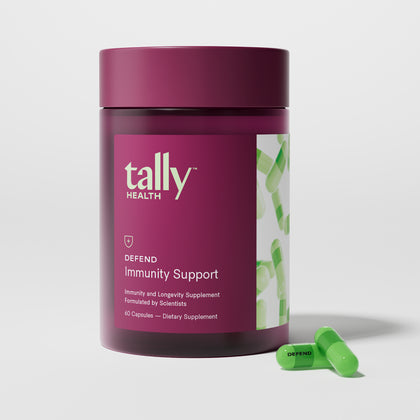

For most of us, vitamin C brings to mind orange juice, immune support, and maybe a glass of an Emergen-C drink mix during the cold season. But this essential nutrient—also known as ascorbic acid—does far more than help your immune system.
Vitamin C plays critical roles in cellular defense, collagen formation, cardiovascular health, and protection against oxidative stress. Let’s explore what the science says about its benefits beyond immune support, and how to maintain optimal vitamin C status for long-term health.
The Many Functions of Vitamin C

Vitamin C is a water-soluble vitamin that the body cannot produce or store efficiently. It’s required for a wide range of biological processes:
Collagen synthesis: Essential for the formation of collagen, the protein that supports healthy skin, joints, and blood vessels.
Antioxidant defense: Acts as a potent antioxidant vitamin, helping neutralize free radicals and regenerate other nutrients like vitamin E.
Neurotransmitter production: Supports brain function by participating in the synthesis of norepinephrine and serotonin.
Iron absorption: Enhances the absorption of non-heme iron from plant-based foods, supporting red blood cell health.
These diverse functions make vitamin C vital not just for immunity—but for total body health.
Vitamin C and Cardiovascular Health

Emerging evidence suggests that maintaining adequate vitamin C intake may help protect the cardiovascular system. Studies have linked higher plasma vitamin C concentrations with lower risk of cardiovascular disease and hypertension.
Vitamin C supports healthy blood vessels by promoting collagen integrity in arterial walls and improving endothelial function. Its antioxidant properties may also reduce oxidative stress and inflammation—two key drivers of heart disease.
However, individuals with low plasma vitamin C levels often show increased markers of oxidative stress and endothelial dysfunction, emphasizing the importance of consistent intake through both diet and/or supplementation.
Vitamin C and Skin Health

Your skin is one of the largest reservoirs of vitamin C in the body—and one of the first places deficiency shows up.
Vitamin C plays multiple roles in skin function and appearance:
Collagen Production: The skin’s firmness and elasticity depend on collagen. Vitamin C acts as a cofactor for enzymes that stabilize and cross-link collagen molecules—helping to reduce sagging and fine lines.
Photoprotection: As an antioxidant, vitamin C helps neutralize free radicals caused by UV exposure, pollution, and stress. This protects skin cells from oxidative damage that accelerates skin aging.
Wound Healing: Adequate vitamin C concentrations are necessary for new tissue formation and poor wound healing can be an early sign of deficiency.
Brightening & Tone: Vitamin C interferes with melanin production, helping improve uneven pigmentation and enhance radiance.
Research shows that individuals with lower plasma vitamin C often experience dullness, rough texture, and slower recovery from sun damage.
While topical vitamin C serums are popular, dietary and supplemental vitamin C are just as critical for maintaining healthy skin from within—helping boost leukocyte vitamin C concentration (in white blood cells) and collagen synthesis at the cellular level.
Vitamin C and Longevity

Large population studies like the National Health and Nutrition Examination Survey (NHANES) have shown that individuals with higher vitamin C intakes tend to have lower rates of chronic diseases and better aging outcomes.
Low or decreased vitamin C concentrations have been associated with poor wound healing, fatigue, and reduced immune function—all of which may affect long-term health and resilience.
Maintaining optimal plasma concentrations of vitamin C may help slow age-related cellular damage, supporting healthy skin, immune function, and metabolic balance.
How Much Vitamin C Do You Need?
The Recommended Dietary Allowance (RDA) for vitamin C is set at:

However, recent data suggest these values may underestimate what’s needed to reach optimal plasma vitamin C concentrations for antioxidant protection.
Because vitamin C is water-soluble and excreted quickly, higher vitamin C intakes—through both diet and supplementation—can help sustain healthy levels in the blood and white blood cells (leukocyte vitamin C concentration).
Why Food Alone Often Isn’t Enough

While vitamin C rich foods like citrus fruits, bell peppers, broccoli, and Brussels sprouts are excellent sources, the body’s ability to maintain optimal levels can be limited by diet alone.
Dietary vitamin C intake fluctuates widely based on storage, cooking methods, and absorption efficiency. Studies show that even those with a balanced diet may have lower plasma vitamin C than ideal.
That’s where vitamin C supplementation can play a valuable role.
Science-Backed Tips to Boost The Benefits of Vitamin C

Supplement Strategically:
Daily supplementation with Defend by Tally Health provides a precise dose of vitamin C (ascorbic acid)—designed to help sustain healthy plasma concentrations that diet alone may not achieve.
Prioritize Whole Foods:
Add vitamin C–rich foods to every meal—think citrus fruits, strawberries, kiwi, bell peppers, and leafy greens.
Mind the Cooking:
Because vitamin C is a heat-sensitive, water-soluble vitamin, try steaming or lightly sautéing vegetables instead of boiling to preserve nutrient content. Better yet, try snacking on raw fruits and veggies.
Stay Consistent:
Regular daily intake—rather than sporadic high doses—supports more stable body vitamin C levels.
Monitor Your Levels:
If you experience fatigue, frequent illness, or poor wound healing, you may have a vitamin C deficiency. Discuss vitamin C supplement use with your healthcare provider.
The Takeaway - Health Benefits Beyond the Immune System
Vitamin C is far more than an immune booster—it’s an essential nutrient for the heart, skin, brain, and longevity. While food is a foundation, supplemental vitamin C may be key to achieving optimal levels for modern health.
A daily habit—backed by science—can help you maintain resilience from the inside out.
References
Traber and Stevens. Vitamins C and E: beneficial effects from a mechanistic perspective. Free Radic Biol Med 2011; https://doi.org/10.1016/j.freeradbiomed.2011.05.017
Pullar et al. The Roles of Vitamin C in Skin Health. Nutrients 2017; https://doi.org/10.3390/nu9080866
Padayatty et al. Vitamin C as an antioxidant: evaluation of its role in disease prevention. J Am Coll Nutr 2003; https://doi.org/10.1080/07315724.2003.10719272
Morelli et al. Vitamin C and Cardiovascular Disease: An Update. Antioxidants (Basel) 2020; https://doi.org/10.3390/antiox9121227
Zhang et al.Serum Vitamin C concentrations are inversely related to biological aging: a population-based cross-sectional study. Eur J Med Res 2025; https://doi.org/10.1186/s40001-025-03150-w
What does vitamin C do for the body?
Vitamin C plays critical roles in cellular defense, collagen formation, cardiovascular health, and protection against oxidative stress. It’s required for collagen synthesis, antioxidant defense, neurotransmitter production, and iron absorption—making it vital not just for immunity but for total body health.
How much vitamin C do you need per day?
The Recommended Dietary Allowance (RDA) for vitamin C is 90 mg/day for men aged 19+ years and 75 mg/day for women aged 19+ years. However, recent data suggest these values may underestimate what’s needed to reach optimal plasma vitamin C concentrations for antioxidant protection.
How does vitamin C benefit skin health?
Vitamin C supports skin firmness and elasticity by promoting collagen production, protects against oxidative damage from UV exposure and pollution, aids wound healing, and helps brighten skin by interfering with melanin production. Individuals with lower plasma vitamin C often experience dullness, rough texture, and slower recovery from sun damage.











